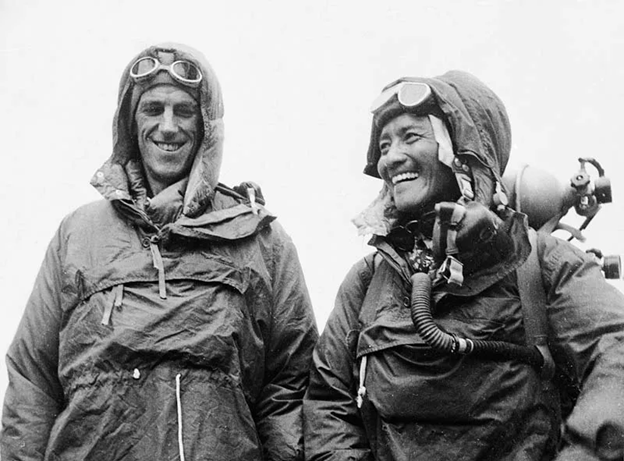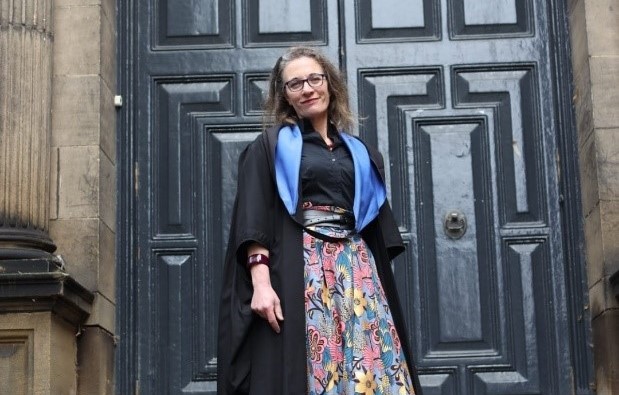Finding my Norgays: Reflections on undertaking a Masters degree through a scholarship
Blog

Finding my Norgays: Reflections on undertaking a Masters degree through a scholarship
Beth Leeming is one of 25 students awarded a Masters scholarship from the ARC North East and North Cumbria. Beth is a community midwife with an interest in Forced Migrant Maternal Health. She has now completed the course, and was awarded a distinction. She shares her thoughts about her Masters journey, in this blog.
I undertook a masters in public health and health services research at Newcastle University during 2022-23 funded by a scholarship from the NIHR Applied Research Collaboration North East and North Cumbria.
I would say that my experience of the Master’s programme could be summarised by a quote from the Cohen brothers’ film Intolerable Cruelty (2003) where the protagonist, played by George Clooney, describes how in 1953 Edmund Hillary (pictured above) became the first man to step onto the summit of Mount Everest because of the assistance and expertise shared with him by Sherpa Tensing Norgay: ‘Few great accomplishments are achieved single-handedly…most have their Norgays.’
There is no doubt that the Distinction awarded for the MSc, which I completed in September 2023, could be attributed to the many people who have helped me along the way. In the initial instance, the provision of an NIHR ARC NENC scholarship provided the catalyst to enable me to return to university at a time of my life when opportunity costs could have precluded further study.
By background, I am a community midwife with an interest in Forced Migrant Maternal Health. For some time, I have held the simple, yet ideological, ambition that I would like to do what I can to improve Forced Migrant Maternal Health here in the North East. To equip myself to make my ambition a reality, I needed to increase my familiarity with the research process. My initial step was to undertake the Nurses, Midwives, and Allied Health Professionals (NMAHP) Research Internship at Newcastle Hospitals.
I first became aware of the NIHR ARC NENC during my NMAHP Research Internship, when I took the opportunity to attend an NIHR ARC NENC Networking Event at the University of Cumbria. The academic connections made at this event were invaluable. I was introduced to ARC fellows from the NIHR ARC NENC Supporting Children and Families research group, who encouraged me to apply for a Master’s Scholarship.
During the Masters, my philosophy of midwifery became challenged and extended through the application of public and global health perspectives about the social determinants of health (1).
I have come to appreciate how the distal determinants of health (upstream or indirectly affecting health) can provide a barrier to health, which can preclude women’s ability to address the more proximal determinants of health (downstream or directly affecting health), such as smoking.
For my dissertation, I had the privilege of undertaking primary qualitative research, supervised by Prof Judith Rankin and Dr Lem Ngongalah from the Population Health Sciences Institute at Newcastle University. My dissertation topic remained true to my passion to investigate factors that affect Forced Migrant Maternal Health.
Influenced by my newfound understanding of the importance of distal social determinants of health, my research topic was on the unresearched area of what midwives know about the implications of the Nationality and Borders Act (2022) for pregnant women seeking asylum.
The results fell firmly within the NIHR ARC NENC remit of supporting families and addressing health inequalities, in this case concerning the risk that The Nationality and Borders Act (2022) could compound the risk of adverse perinatal outcomes for women seeking asylum. I remain grateful to the 18 midwives from across the region who were prepared to take part in my research despite acknowledging that they were unlikely to know much about the subject area, given the distance of migration legislation from the coalface of maternity service provision.
Looking back on my experience of postgraduate study, I would say that my ambition to help improve maternal and child health for women seeking asylum has become tempered by the reality and limitations of what one person can achieve. However, my capacity to make a difference, with assistance from my own group of Norgays, has probably increased.
I find myself in a position of looking for PhD opportunities to continue to extend the evidence base for the cause of pregnant forced migrant women who would like to claim asylum here in the UK, something I would not have even considered if I hadn’t had the opportunity to undertake a masters afforded to me by the ARC NENC. I remain sincerely grateful for the scholarship which has facilitated the current trajectory of my career path and to my supervisors who steered me on my way!
Header image: Sir Edmund Hillary and Tensing Norgay on their Mount Everest expedition (1953)
Below: Beth at her graduation in 2023.

References: 1. Solar O, Irwin A. A Conceptual Framework for Action on the Social Determinants of Health. Geneva: World Health Organisation; 2010.